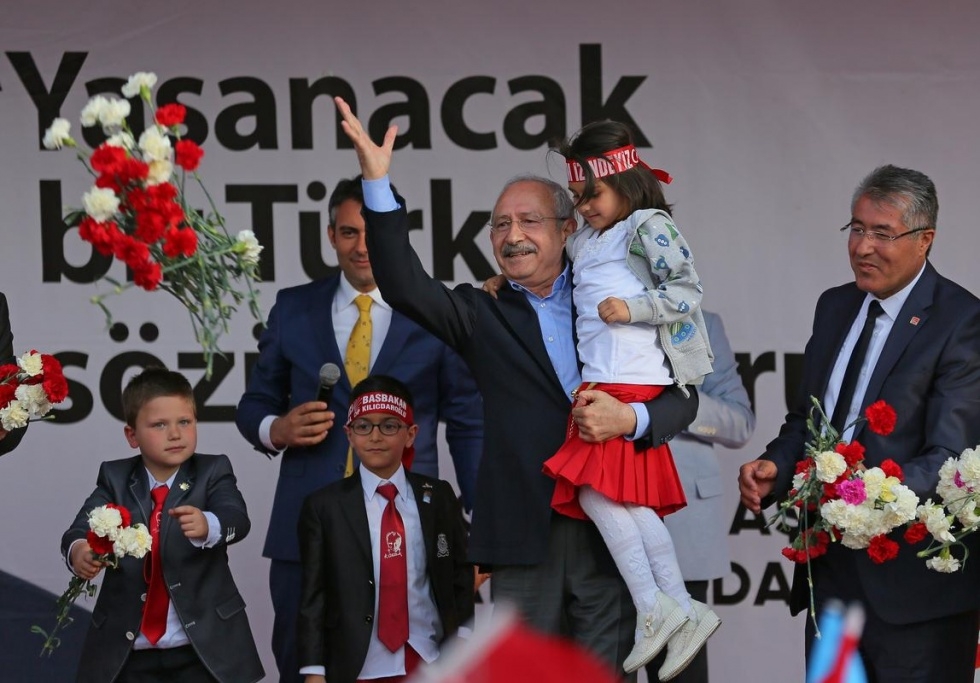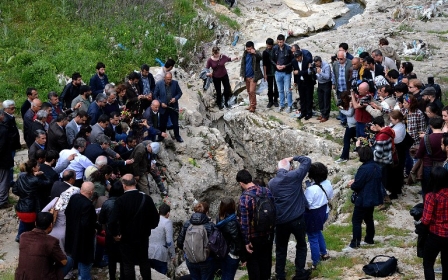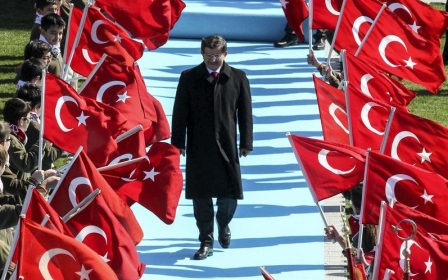ANALYSIS: Turkey's political parties rally supporters for elections

Turkey could be approaching a turning point that may drastically affect its political direction. The Justice and Development Party (AKP) rule of the last 13 years could slip away; according to some opinion polls its votes in the election on 7 June could remain below the necessary majority to form a single-party government.
The main reasons for this are the significant changes in the electoral politics of Turkey over recent years and reactions to the unfair electoral system. WIth an election threshhold for entering parliament still at 10 percent, it is a challenge for opposition parties.
The threshold is a worry for the mainly Kurdish People's Democratic Party (HDP), since the Kurdish political movement decided to become a nationwide force earlier in February. Their decision to run for the election as a party was an unexpected move for many and a potentially risky one.
So far, Kurds have only sought to become members of the parliament as independent candidates in order to overcome the threshold problem, and formed their party groups once in the parliament. Securing as many as 35 seats after the 2011 elections, this time HDP is seeking to get even more MPs elected and benefit from the generous treasury grant that is given to the parties who make it into parliament.
The potential game-changing position of HDP has had an impact on the remaining three parliamentary parties, which are trying to develop strategies accordingly and address different segments of society.
While the AKP is aiming to keep itself singlehandedly in power, the main opposition Republican People's Party (CHP) and the Nationalist Action Party (MHP) aspire to broaden their voting bases to end the reign of the AKP by denying it a majority.
In the meantime, former prime minister and now President Recep Tayyip Erdogan has been delivering public addresses almost every other day. Most of the time he is seeking votes that could let the new government unilaterally change the constitution and pave the way for what could be called a "super-presidential system" with extended executive powers.
Erdogan's attempts have been heavily criticised by the three opposition parties, as the current constitution tells the president to remain impartial and non-partisan. By contrast, Erdogan is constantly criticising the opposition parties and warning the electorate against a coalition scenario, should AKP not be able to secure a majority.
Election manifestos
The Turkish electorate will decide on the matters that affect them most, such as the economy and domestic politics. However, the outcome of the election will obviously affect politics in the Middle East at large, in addition to matters that concern NATO and its allies.
While there are significant similarities in the way the opposition parties have formulated their manifestos, the AKP, with the confidence of being the government party, focused on the continuation of its long-standing policies.
On the domestic side, the economy is the main issue. Considering the relative slowdown of economic growth in the country as well as dramatic depreciation of the Turkish lira against foreign currencies over recent months, the four parties dedicated most of their platforms to their economic policies and promises.
AKP's focus is the continuation of the macroeconomic gains and consolidation of these gains with microeconomic adjustments. Due to the bottleneck that the Turkish economy is facing over private debts and decreasing domestic production, the AKP is pushing for an increase in industrial output and is putting an emphasis on research and development activities.
All three opposition parties, on the other hand, are focus on short-term benefits for the general populace, especially making concrete promises to appeal to lower income voters. Dramatic increases in the minimum wage, extra benefits for pensioners, and rental and food aid for the poor are among the promises.
According to Sadik Unay, the economic research director at the Ankara-based think tank SETA, these types of promises are reminiscent of the populist parties of 1990s. Specifically referring to the CHP, Unay said: "It is difficult to benefit from an undisciplined fiscal populism and material gain promises on the basis of clientelism.
"For such a manifesto to become successful, Turkey should have been going through a deep economic crisis, and a political party and programme should have been present to resolve the crisis." But for him, these elements are non-existent at the moment.
The lofty promises of the opposition parties appear unrealistic for some, but the parties seem determined to curb the neoliberal policies that the government party has been pursuing over the past 13 years.
All three opposition parties promise to increase job security and work safety and ameliorate working conditions. In a way, they are focusing on matters in societal consciousness - in the wake of incidents such as mining disasters and widespread subcontracting activities.
Foreign policy
As in its economic programme, the AKP is planning to carry forward the foreign policy vision it has developed over the course of several years. Without addressing any of the concrete issues in its immediate neighbourhood, whether it be the Islamic State (IS) to its south or Western powers' nuclear deal with Iran to its east, the AKP manifesto reiterates the multilayered foreign policy of the party.
The main opposition party CHP, on the other hand, highlights AKP's foreign policy preferences that are deemed to be failures, such as worsening relations with the European Union, sectarian and adventurous foreign policy, and regional isolation.
According to Soli Ozel, an international relations professor at Kadir Has University, the parties’ manifestos are similar in that they place Turkey in the international arena. They also seem to agree on which principles Turkish foreign policy should be based. However, they differ in their policy priorities. While CHP holds AKP accountable for pushing the country further into the Middle East and slipping away from the EU objective, the AKP sees the EU membership bid as a strategic long-term goal rather than an essential one.
"The AKP is - rightfully - pointing out the EU's share in the frozen negotiations, but it does not admit the deficiencies on Turkey's side," Ozel argued.
However, the most striking difference between AKP and CHP foreign policy choices appear when it comes to IS and the Middle East at large. CHP once again holds AKP accountable for Turkey's diminishing international image as a "springboard for terrorists".
According to Saban Kardas, the president of the Ankara-based think tank ORSAM, the continuity pattern of AKP's foreign policy is the underlying idea of the manifesto. Especially considering the political uncertainties of the Middle East in the aftermath of the Arab Spring, it is difficult to formulate a country-specific approach.
"Although it is possible to make sense and explain current foreign policy issues in line with AKP's approach, it is worth noting that the party does not specifically address Iraq, Syria and Egypt due to the deadlock in these countries," Kardas said.
"Considering what has been done until now and what is promised for the future, the will for continuity of the current policies is the primary objective."
Kurdish issue
The issue that all four parties differ most on is how they approach the decades-old Kurdish problem. While the AKP is promising to carry forward the talks with outlawed Kurdistan Workers' Party (PKK) leader Abdullah Ocalan, once re-elected, it promises further concrete steps.
The government party pledges to expand democratic rights and freedoms and codify them with a brand new constitution. At the same time, it focuses on the total elimination of the Kurdish armed struggle.
The main opposition, CHP, is also promising a final resolution with negotiations, but it does not specify who will be the negotiating parties. According to Vahap Coskun, a law professor at Dicle University in the Kurdish-populated southeastern city of Diyarbakir, the lack of specifics regarding the negotiating parties raises doubts about the party's intention.
"When CHP articulates negotiations, does it mean the political parties in the parliament, or does it include the PKK and Ocalan in the equation? AKP and HDP both have a clear stance in this; they already talk with the PKK and Ocalan," Coskun said.
"But is CHP ready to talk with Ocalan and the PKK? [Kemal] Kilicdaroglu has, on many instances, expressed his disapproval over the talks with Ocalan. Did he change his mind?" the professor inquired.
The mainly Kurdish HDP is supportive of the direct talks led by the AKP, but it is adopting a delicate language to make sure it does not estrange the non-Kurdish electorate, which will play a crucial role in helping the party overcome the election threshold.
According to Vahap Coskun, to secure votes around the country, HDP is deliberately referring to the 10- point declaration that was written by Ocalan and announced earlier in February by the joint AKP-HDP delegation. "'Democratic republic and shared motherland' is the essence the declaration and HDP is making sure that Kurdish issue is resolved within a pluralistic democratic environment," Coskun said.
Meanwhile, the MHP sees the resolution process as basically a surrender to the PKK and once elected as government, they promise to nix the talks entirely.
Considering the complicated electoral calculations and HDP's chances of getting into parliament, a new government in Turkey will certainly bring about significant changes on many levels. No matter what the outcome is, the election manifestos and realisation of any of them will signal a new set of winners and losers in the country.
New MEE newsletter: Jerusalem Dispatch
Sign up to get the latest insights and analysis on Israel-Palestine, alongside Turkey Unpacked and other MEE newsletters
Middle East Eye delivers independent and unrivalled coverage and analysis of the Middle East, North Africa and beyond. To learn more about republishing this content and the associated fees, please fill out this form. More about MEE can be found here.




